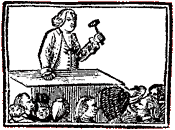Whatever Happened to Jesse Saville?
Hutchinson said Saville “had been most inhumanly treated for seeking redress in the course of the law for former injuries received.” He complained that Gloucester was becoming a violent town.
In his history of Massachusetts, Hutchinson complained, “The house suffered the message to lie more than a fortnight; but, two or three days before the assembly must, by the charter, be dissolved, they sent a very long answer.”
This was delivered by a committee that included strong Whigs John Hancock, Joseph Hawley, and James Warren. In part, they complained:
…we cannot think it consistent with the justice of this house, to come into measures which may imply a censure upon individuals, much less upon a community hitherto unimpeached in point of good order: or even to form any judgment upon the matter, until more light shall appear than the papers accompanying your message afford. The house cannot easily conceive what should determine your honour so particularly to recommend this instance to the consideration of the assembly, while others of a much more heinous nature and dangerous tendency have passed altogether unnoticed in your message…The committee then took the opportunity to renew all the complaints about the king’s soldiers sent to Boston in 1768. It was, after all, the year of the Boston Massacre. The exchange was reprinted in British periodicals, making the third mobbing of Jesse Saville an element in the larger imperial conflict.
But Gov. Hutchinson never mentioned Saville’s name. He was, after all, just a tanner. The General Court committee likewise didn’t name this Customs employee. And that conflict was soon lost in the wash of other disputes, surviving only in the Essex County courts.
When I started the research for this series of postings about Jesse Saville, I found a secondary-source reference to yet another mob attack on him in 1771. But studying that reference further showed me it used language from the 1769 attack, so I think that was just an error.
Therefore, I have no sources on Saville’s experiences as Massachusetts’s conflict with the Crown heated up in the early 1770s, and as the war started. In fact, I’m not even sure he continued to work for the Customs service. He certainly didn’t move into Boston and evacuate with other revenue officers.
And that’s the biggest surprise of this story: Jesse Saville, mobbed three times in three years for helping His Majesty’s Customs Office, didn’t become a Loyalist. In fact, his son John, born in 1768, is reported as having gone to sea at 1782, being taken by a British frigate, and never returning.
Jesse Saville stayed in Gloucester. When his first wife, Martha, died in 1785, he remarried the next year to a woman named Hannah Dane and had a couple more children. When he died in 1823, Saville’s property included half of a house, half of a barn, a couple of pastures, and “1/4 part of a Pew in Squam Meeting House.”
Furthermore, he merited a fairly long obituary in the 26 March Columbian Centinel:
Mr. Saville was possessed of an uncommonly strong mind, and a very retentive memory. There was not a man perhaps in Gloucester who possessed such a perfect recollection of ancient transactions, grants, and land marks, as did Mr. Saville; for he seemed to have contained in his head, a successive record of all events; and more especially those of a local nature, for more than 70 years.—Murray’s meetinghouse, built in 1806, appears above.
In his political character, he was an undeviating FEDERALIST, adhering strictly to the sentiments of the immortal WASHINGTON, whom he always considered the polar star in the American political hemisphere.
In his religious theory, he was a Universalist, having the most unwavering belief in the great doctrine of reconciliation by JESUS CHRIST, as taught by the late Rev. JOHN MURRAY.
Not everyone was as admiring as New England’s Federalist newspaper. In his 1860 local history, John J. Babson noted Saville’s work as a Customs officer and stated:
The strict performance of what he considered his duty made him odious to his townsmen, and for it he suffered severely in his person and property. It also subjected him to annoyance in later days, as the hostile feelings engendered by his official acts long survived the events which called them forth.Nonetheless, Babson deemed Jesse Saville as having “lived a useful but retired life.”





